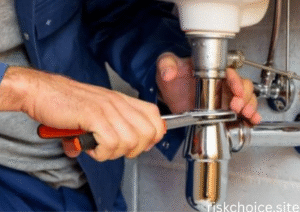
While running a plumbing company can be quite successful, there are also certain hazards involved. From inadvertent property damage to injuries on the job, even the most seasoned plumbers deal with issues that might cause legal or financial problems. Business insurance for plumbers becomes quite crucial in this regard.
We will discuss in this article:
Which kinds of insurance plumbers should have?
Why should plumbing companies have insurance?
The cost of plumbers’ business insurance
How one should select the appropriate coverage?
Typical errors to keep away from
Let’s start now.
For what reason do plumbers need business insurance?
Every day you run several hazards whether you own a plumbing company or are a licensed plumber. Among the most often occurring are some of:
Water damage brought on by malfunctioning installations
Injuries to third parties or clients
Workers’ injuries on construction sites
Theft of machinery and tools
Legal actions against disgruntled consumers
Any one of these could result in thousands of dollars in damages or legal bills. Your plumbing company may suffer—or perhaps close without appropriate insurance.
Plumbing business insurance provides financial security, legal help, and piece of mind to let you concentrate on your strongest suit: fixing plumbing issues.
Kinds of Business Insurance Coverage Plumbers Should Get
No one-size-fits-all rule exists for plumbers. Your company size, location, and sort of work you conduct will probably determine the mix of coverage choices you require. The following are the most crucial kind of insurance plumbers should give thought:
1. General Liability Coverage
Any plumbing company needs this insurance the most of all.
It touches:
Bodily harm done to third parties
Damage of property
Medical fees and legal expenses
Advertising damages—that is, libel or slander—
For instance, general liability will pay for damages should you unintentionally flood a client’s kitchen while installing a pipe.
2. Error and Omission Professional Liability Insurance
Also referred to as E&O insurance, this covers you should a customer say your job was poor or resulted in financial damage.
For instance, this protection covers legal expenses should a client sue you for improper water heater installation even if you did nothing illegal.
3. Workers’ Compensation Coverage
Most states have legal requirements for this coverage if you have staff members.
covers:
Medical receipts
Lost salaries
Healing expenses
Benefits related to disability or death
For instance, workers’ compensation pays for medical bills and missed income should your employee fall while working on a commercial plumbing job.
4. Commercial Vehicle Insurance
Commercial auto insurance is required whether you move tools and supplies by vans or trucks.
It discusses:
Errors
Damage to another car or piece of property
Damages to other drivers
Note: Personal auto insurance excludes vehicle use connected to work.
5. Insurance on Tools and Equipment
You run your company on your tools. Whether your van, shop, or on a job site, this coverage guards against loss, theft, or damage to your plumbing equipment.
6. insurance for commercial property
Should you lease or own office or warehouse space, this guards your property against fire, theft, vandalism, and natural disasters.
7. Policy of Business Ownership (BOP)
Combining commercial property insurance with general liability at a reduced rate is what a business owner’s policy does. Small to mid-sized plumbing businesses find it perfect.
Plumbers’ Business Insurance Costs: How Much?
Plumbing company insurance’s cost relies on numerous elements:
Your company’s revenue and scope
Location (state legislation, urban against rural)
personnel count
varieties of coverage
Claims record
Average Cost Breakdown: Monthly Cost Annual Cost of Insurance Type
Liability in general 50–90 600–1,100
Employees’ Compensation Between $100 and $250 1,200–3,000 dollars
Commercial Autos $130–$200 $1,500—$2,400
Tools and Instruments $15 – $30 $180–$360 BOP, or liability plus property $100 to $160; $1,200 to $1,920
Advice: Combine plans for best prices. Discounts for combined packages are available from several insurers.

Ad advantages of business insurance for plumbers.
To be honest, nobody wants to pay money on something they might never use. Still, the advantages of obtaining appropriate plumbing insurance are really great:
Financial Protection: Handers expensive litigation and claims.
Legal Compliance: Many states demand for licencing.
Client Trust: Develops reputation with both residential and business clientele
Peace of Mind: Concentrate on your work free from “what ifs”.
How Should Your Plumbing Company Select Their Insurance?
Here is a detailed road map for obtaining the correct insurance:
1. Evaluate Your Own Risk Factors.
Mostly do you work on residences or business sites? Are you in charge of staff? Knowing your exposure guides your policy selection.
2. Sort Quotes From Several Insurers
Work with a local broker or use web sites. Compare coverage always, not only cost.
3. Evaluate the insurer’s standing.
Check ratings on websites like AM Best or BBB, read reviews, and ensure they have expertise insuring trades like plumbing.
4. Tailor Your Policies
Don’t overpay for something you don’t need, but avoid skipping necessary coverage either.
5. Review every year.
Your company expands; so, your insurance should also. Every year review policies and change coverage.
Typical Mistakes to Steer Clear of
Not always is getting the Bare Minimum Cheaper better. Underinsurance might be just as harmful as not having any insurance.
Not Share Complete Information
Tell your insurer straight forwardly always. Denied claims might follow from misrepresentation.
Ignoring About Equipment
One big investment is tools; make sure you cover them.
Not Changing Coverages
acquired more employees acquired a new van. Driven offices? Changing your policy will help.
SEO Benefits: Why Should Plumbers Write About Business Insurance?
Creating material around “business insurance for plumbers” is not only educational but also an SEO gold mine if you own a plumbing company with a website. People are looking for these actively:
“Plumber liability insurance.”
“How much would plumbing insurance run?”
” Insurance needs for plumbers in [state]”
“Top plumbers insurance firms”
Including these linked keywords in FAQs, landing pages, and blog entries will help your website show better and increase traffic.
Thoughts on Final Matters
Whether you manage a sizable plumbing business or are a solo contractor, business insurance for plumbers is a need. It is a wise investment in the long-term viability and reputation of your business, not only a safety net.
The appropriate coverage yields:
Legal safeguards
client faith
Business dependability
Insurance is not optional in a trade like plumbing; it is rather necessary.
Commonly asked questions (FAQs)
Q: Does plumber business insurance make sense?
A: Indeed, particularly if you have staff, cars, or engage in tasks that could compromise property. Many states call for it for licencing.
Can I purchase plumbing insurance online?
A sure. Several respectable companies, including Hiscox, Next, and Progressive, have quick quotations and online instant coverage.
Q: Suppose I work part-time?
A: There are still reasonably priced part-time or short-term policies designed for gig workers or part-time employees.
How can I show a client I am insured?
A Certificate of Insurance (COI) your insurance provider can provide you to distribute to contractors and clients.
